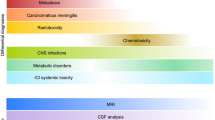Abstract
Background
Immune checkpoint inhibitors (ICIs) are a promising class of anticancer drugs associated with immune-related adverse events (IRAEs). In registration studies of selected cancer populations, neurologic IRAEs were rare. Post-marketing experience describing their prevalence in clinical practice continues to be reported.
Methods
A retrospective cohort of patients treated at our institution with ICIs from 2005 to 2017 was identified. Patients with new neurologic ICD codes documented during or after ICI treatment were enrolled. Comprehensive medical record review identified patients with neurologic IRAEs causally linked to ICIs. This study focused on CTCAE grade 2–4 IRAEs.
Results
526 patients were screened; 55 candidate patients were identified; 5 cases met criteria for neurologic IRAEs, an incidence of 0.95% (n = 5/526). IRAEs identified were transverse myelopathy, demyelinating sensorimotor polyneuropathy, oculomotor nerve palsy, sensory neuropathy, and posterior reversible encephalopathy syndrome. ICIs were held in three patients, rechallenged in one, and dose-reduced in one. Corticosteroids were given in three patients, and response varied from complete symptom resolution to minimal response and ultimately death. Other treatments were based on IRAE presentation, including gabapentin, antihypertensives, and IV immunoglobulin. Patients with combination therapy appeared to suffer more severe IRAEs producing more substantial long-term morbidity and mortality.
Conclusion
In this clinical practice study, the incidence of neurologic IRAEs from ICIs was 0.95%. Although rare, neurologic IRAEs can be highly variable and severe, and patients with combination immunotherapy appeared to suffer more severe IRAEs. Neurologists play an important role in the early identification and management of IRAEs to reduce long-term morbidity and mortality.


Similar content being viewed by others
References
Cuzzubbo S, Javeri F, Tissier M et al (2017) Neurological adverse events associated with immune checkpoint inhibitors: review of the literature. Eur J Cancer 73:1–8
Eggemont AM, Chiarion-Sileni V, Grob JJ et al (2015) Adjuvant ipilimumab versus placebo after complete resection of high-risk stage III melanoma (EORTC 18071): a randomised, double-blind, phase 3 trial. Lancet Oncology 16(5):522–530
Weber JS, D’Angelo SP, Minor D et al (2015) Nivolumab versus docetaxel in advanced nonsquamous non-small-cell lung cancer. N Engl J Med 373(17):1627–1639
Maur M, Tomasello C, Frassoldati A, Dieci MV, Barbieri E, Conte PF (2012) Posterior reversible encephalopathy syndrome during ipilimumab therapy for malignant melanoma. J Clin Oncol 30(6):76–78
Larkin J, Chmielowski B, Lao CD et al (2017) Neurologic serious adverse events associated with nivolumab plus ipilimumab or nivolumab alone in advanced melanoma, including a case series of encephalitis. Oncologist 22:709–718
Postow MA, Chesney J, Pavlick AC et al (2015) Nivolumab and Ipilimumab versus ipilimumab in untreated melanoma. N Engl J Med 372(21):2006–2017
Author information
Authors and Affiliations
Contributions
SM analysis and interpretation of data, primary author of manuscript. TL critical revision of manuscript. TA critical revision of manuscript. UT acquisition of data, critical revision of manuscript. AD critical revision of manuscript. WJP study concept and design, study supervision, and critical revision of manuscript. RES study concept and design, study supervision, and critical revision of manuscript.
Corresponding author
Ethics declarations
Conflicts of interest
Sarah Mancone: reports no disclosures. Thomas Lycan: reports no disclosures. Tamjeed Ahmed: reports no disclosures. Umit Topaloglu: reports no disclosures. Andrew Dothard: reports no disclosures. William J. Petty: reports no disclosures. Roy E. Strowd: Dr. Strowd is the Deputy Section Editor of the Resident and Fellow Section of Neurology and receives grant support from the American Academy of Neurology for work unrelated to this manuscript.
Ethical standard statement
This study was reviewed and approved by the institutional review board IRB #00044126.
Additional information
No statistical analysis conducted.
Electronic supplementary material
Below is the link to the electronic supplementary material.
Rights and permissions
About this article
Cite this article
Mancone, S., Lycan, T., Ahmed, T. et al. Severe neurologic complications of immune checkpoint inhibitors: a single-center review. J Neurol 265, 1636–1642 (2018). https://doi.org/10.1007/s00415-018-8890-z
Received:
Accepted:
Published:
Issue Date:
DOI: https://doi.org/10.1007/s00415-018-8890-z




